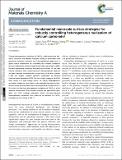Fundamental nanoscale surface strategies for robustly controlling heterogeneous nucleation of calcium carbonate
Author(s)
Zhao, Junjie; Wang, Minghui; Jebutu, Mofoluwaso S.; Zhu, Minghui; Gleason, Karen K.
DownloadPublished version (1.054Mb)
Terms of use
Metadata
Show full item recordAbstract
© The Royal Society of Chemistry. Tuning heterogeneous nucleation of CaCO3 could enable new bio-mimic structures and address inorganic fouling in desalination and petroleum industries. However, few fundamental principles exist to guide surface modification for controlling this complex nucleation process. Additionally, industrial applications often require high stability for harsh operational conditions and nanoscale thickness for low heat transfer resistance. Such robust nanoscale coating materials have not yet been reported, motivating the current study of durable ultrathin (≤100 nm) organic covalent networks synthesized by initiated chemical vapor deposition (iCVD). The low surface energy of the iCVD films results in a high energy barrier for CaCO3 heterogeneous nucleation, leading to slow kinetics with extended induction periods. We also found the dominant role of electrochemical oxidation on Cu/Ni surfaces in affecting heterogeneous nucleation of CaCO3 in a hot aqueous environment. With excellent stability and passivation capability, our iCVD coatings effectively inhibit corrosion-induced heterogeneous nucleation, thus reducing the amount of CaCO3 fouling by up to 14 times at 110 °C.
Date issued
2019-07Department
Massachusetts Institute of Technology. Department of Chemical EngineeringJournal
Journal of Materials Chemistry A
Publisher
Royal Society of Chemistry (RSC)
ISSN
2050-7488
2050-7496